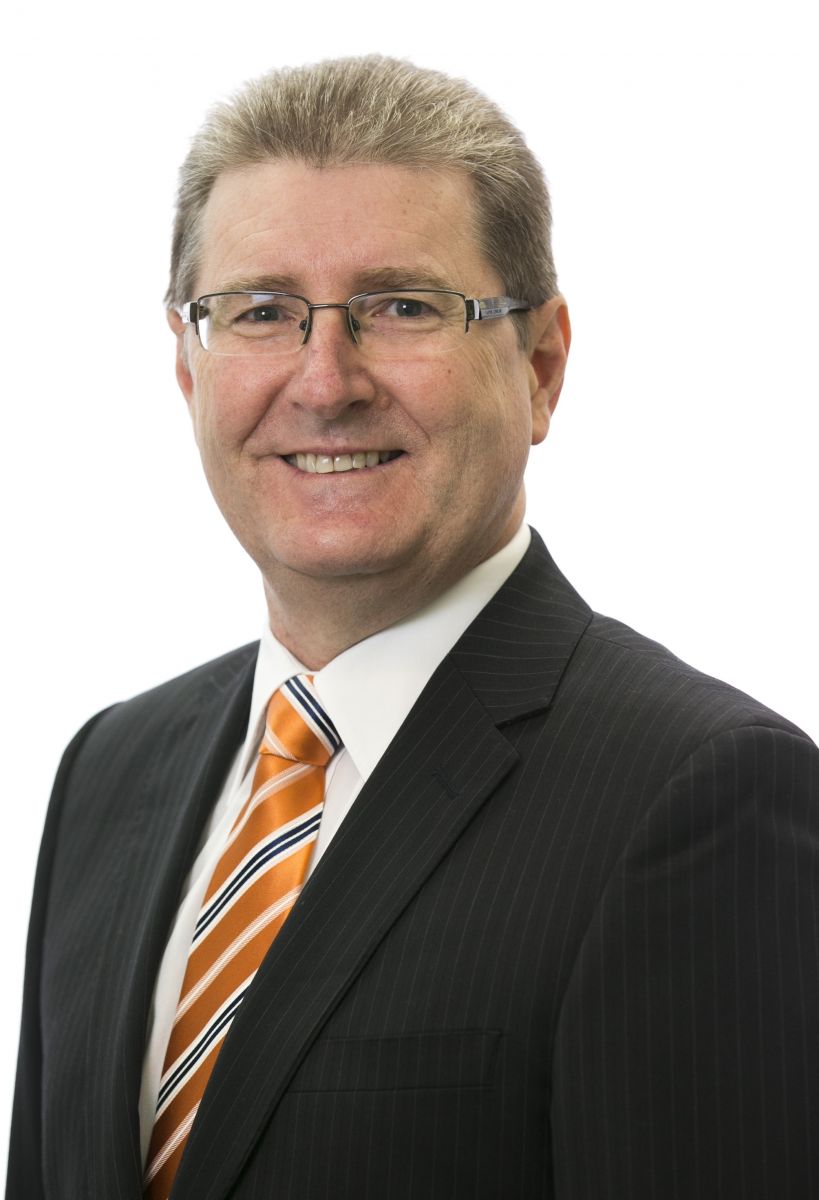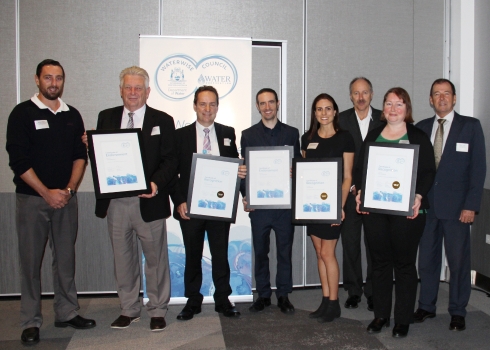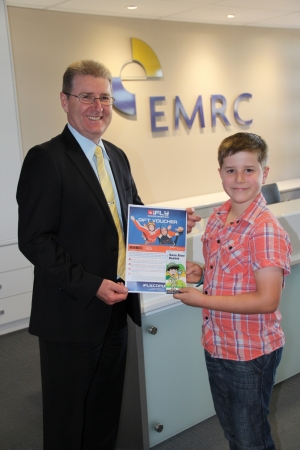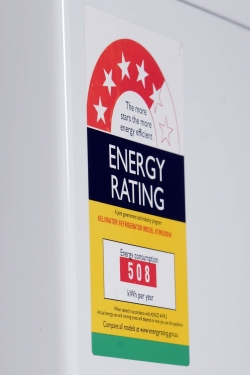EMRC E-Newsletter May 2017

CEO's Message
 The EMRC's dedicated staff strive every day for excellence in all of their work. Many projects, grants and awards received or undertaken by the EMRC arise from innovative ideas staff contribute and from the support of member Councils to our long standing programs. In this issue of the EMRC e-newsletter we are introducing a 'Program in Focus' section, providing the opportunity to share with you a more in-depth view of EMRC work.
The EMRC's dedicated staff strive every day for excellence in all of their work. Many projects, grants and awards received or undertaken by the EMRC arise from innovative ideas staff contribute and from the support of member Councils to our long standing programs. In this issue of the EMRC e-newsletter we are introducing a 'Program in Focus' section, providing the opportunity to share with you a more in-depth view of EMRC work.
We are also proud to announce that local governments within Perth's Eastern Region were formally acknowledged for their water efficiency at the 2017 Waterwise Business Recognition Awards held in early May. The EMRC supported member Councils and the Town of Victoria Park in reaching and retaining Waterwise status.
I hope that everyone enjoys spending time with family and friends during the upcoming Western Australia Day long weekend.
PETER B. SCHNEIDER
Chief Executive Officer
Program in focus - Eastern Region Catchment Management program
For nearly two decades the EMRC has delivered a range of environmental initiatives under the Eastern Region Catchment Management Program (formally Eastern Hills Catchment Management Program). The program is one of the EMRC's most innovative initiatives, demonstrating the benefits of regional collaboration through a successful partnership between the Shires of Kalamunda and Mundaring, City of Swan and Department of Parks and Wildlife; and reaping the success of state and federal government funding.
The Eastern Region Catchment Management program is an overarching framework covering delivery of a diverse range of initiatives that focus on supporting and developing the region's natural assets. The initiatives undertaken as part of the program are shaped by these community groups, stakeholders and member Councils and adapt to emerging issues. The responsive nature of the program allows the EMRC to be at the forefront of environmental initiatives, regularly achieving 'firsts' in the field.
The EMRC's Healthy Wildlife Healthy Lives project is the first of its kind in Australia to focus on the potential harm that can be caused to wildlife through interactions with people. In March this year, the EMRC launched the Healthy Wildlife Healthy Lives website, a key component of project. The EMRC was approached by Murdoch University to partner in the project in recognition of our existing knowledge and involvement with community engagement, communication and education. The EMRC's demonstrated success in managing regional grants and operating across local government boundaries assisted in securing support for the project from Lotterywest.
Another 'first' for the EMRC came in 2015, when we became the first local government in Western Australia to purchase a steam weeder. The steam weeder, which was supported by funding from the Department of Parks and Wildlife, was largely purchased in response to community concerns surrounding the effect of chemicals on human and environmental health. Since this time, the EMRC has continued to explore alternative weed management options and ensure that the community and stakeholders are informed. In 2016, through funding from the Western Australian Government's State NRM Program, the EMRC initiated an alternative weed management trial. The alternative weed management trial monitored the effect of steam, pine oil, pelargonic acid, salt and vinegar solution, competitive planting and mulch on a range of different weeds. Preliminary results from the trial were shared at an EMRC weed seminar and site tour in May 2017, attended by over 60 industry and government representatives, which included celebrity gardener Josh Byrne as a presenter.
The EMRC is also proud to continue to deliver the unique Bush Skills 4 Youth program. Bush Skills 4 Youth has delivered dozens of free workshops in bushland settings for over 1,500 children and 200 adults and continues to provide workshops which include presentations from environmental experts. The pilot program was originally launched in May 2015 with support from Lotterywest. The successful project will continue through to 2018 with funding from the State NRM office. The Bush Skills 4 Youth workshops work closely with EMRC's Waste Education program providing a holistic approach to encouraging behaviours in children that will support future environmental health.
New funding secured this year will further strengthen community partnerships and support the growth of environmental volunteers. The EMRC's Environmental team support a network of environmental volunteers to plan, coordinate and implement bushland restoration projects. The EMRC has employed a Community Engagement Officer to provide the volunteer base with targeted skills development, support recruitment of new volunteers and provide administration support, and to coordinate and grow the existing engaged, capable and proactive community. The project is supported by funding from the Western Australian Government's State NRM Program and adds a new dimension to the Eastern Region Catchment Management Program.
These projects demonstrate the success of the Eastern Region Catchment Management program in building upon the seed funding provided by member Councils to secure state and federal grants. More than one third of grant funding received by the EMRC in 2015/2016 was received under the program; including Federal funding of $100,000 through the 20 Million Trees initiative and more than $42,000 through various Green Army programs; and state government funding including a Lotterywest grant totaling $194,375 to deliver the Healthy Wildlife Healthy Lives project, $105,000 through the Department of Parks and Wildlife and $10,000 from the State NRM office.
The EMRC would like to acknowledge and thank our member Councils, state and federal government and other support partners and all of our volunteers for their continued support of such a special program.
For more information about the Eastern Region Catchment Management Program view our page here
Celebrating Waterwise status
The EMRC, in conjunction with the Shire of Mundaring, Cities of Belmont and Swan and Towns of Bassendean and Victoria Park, has a vision for Perth's Eastern Region to be a leader in achieving water efficiency.
Proudly, this group of local governments in Perth's Eastern Region were formally acknowledged for their water efficiency at the 2017 Waterwise Business Recognition Event that was held on 9 May 2017. The Cities of Belmont and Swan retained their Waterwise status, the Town of Bassendean reached Waterwise status for the first time and the Shire of Mundaring and Town of Victoria Park both reached Gold Waterwise status.
The Waterwise Council program is run by the Water Corporation together with the Department of Water with the aim of building a cooperative working relationship between these state government bodies and local governments to improve water use efficiency. The ultimate goal is for Perth to become and remain a climate resilient community and councils achieving Waterwise status are showing leadership in sustainable water management to help reach this goal.
To reach Waterwise Council status, local governments are required to meet a number of criteria committing to assessing and improving the water efficiency of their buildings as well as training staff. The EMRC supports member Councils and the Town of Victoria Park in reaching and retaining Waterwise status by keeping councils informed of changes to the program, facilitating and assisting councils with joining and undertaking actions under the program, reviewing, analysing and reporting on water usage including site investigations and in developing a Water Efficiency Action Plan.
For more information on the Water Quality and Conservation program view our page here.

(L-R) Jeremy Walker, Town of Bassendean; Bob Jarvis, CEO, Town of Bassendean; Anthony Vuleta, CEO, Town of Victoria Park; Brendan Nock, Town of Victoria Park; Rebecca Ferguson, City of Bayswater; Mark Luzi, Shire of Mundaring; Briony Moran, Shire of Mundaring; Cr David Lavell, President, Shire of Mundaring.
Lucky rambler takes home the prize
EMRC CEO, Mr Peter Schneider, presented a $100 iFly voucher to an excited Lucas Deshon, aged 10, this month as part of the Swan River Ramble.
The Swan River Ramble is a marked path that uses the existing recreational shared path around the Swan River. With help from a stylised character named Eric, the Swan River Ramble is a fun way for children and families to enjoy all that the area has to offer.
The Swan River Ramble was launched on 17 March 2017 to coincide with Bike Week and the Term 1 school holidays. The EMRC ran a competition for those who visited the Swan River Ramble in the opening weeks (17 March 2017 -- 25 April 2017).
Over 100 people entered the competition with Lucas winning the prize. Lucas explained how he and his brother, accompanied by their dad, enjoyed riding their bikes around the Swan River Ramble and how excited they were to learn it runs right past their house.

Swan River Ramble competition winner, Lucas Deshon (age 10) with EMRC CEO, Mr Peter Schneider.
Tips to keep warm and energy efficient this winter
The average home in Western Australia consumes approximately 17 units (kWh) of electricity per day (Synergy 2016), with heating and cooling using most of the electricity in an average Australian home.
Changes in efficiency, and an increase in the number of electrical goods in homes over the past few years, mean that this ratio is changing. More electricity is now used for appliances, particularly refrigeration, which makes up nearly half of the energy used by appliances.
What can you do that is low cost to implement, to reduce the amount of electricity being used in your home?
- On a warmer winter's day, or cooler summer's day, open windows and blinds to let in warm or cool breezes.
- Cover glass windows and doors with curtains or blinds to prevent heat transfer.
- Program air conditioning systems so that they are only used when the rooms are occupied; setting timers can also help avoid wasted energy. In winter it is recommended that you set your heating system to 18C - 21C and cooling to 23C - 25C in summer. Every 1C higher in winter or lower in summer can add 10% to the running costs of your heating and cooling system.
- Turning off fridges and freezers when they are not needed will also help reduce your electricity consumption. For example, a bar or drinks fridge should be turned off when you're not entertaining. If the goods won't go off, such as cans of drinks, consider using a timer to switch it on only when it is needed, such as on the weekends.
- When in use, set your fridge/freezer to the optimum temperature. If your fridge and freezer temperatures are too cold, more energy is being used but if the temperatures are too high it allows food poisoning bacteria to grow. The optimum temperature for a fridge is 4C and freezers should be set between -15C and -18C, you can use a thermometer to check these temperatures.
The EMRC's Achieving Carbon Emissions Reduction program was developed to support member Councils to monitor, mitigate, reduce and report on corporate carbon emissions and to provide education on energy efficiency for the community and local businesses.
For more energy efficiency tips visit our Achieving Carbon Emmissions Reduction (ACER) page.

The more stars an appliance has, the more energy efficient it is.
Council and committee meeting dates
Meeting dates for 2017 are available online:
EMRC Council
EMRC Committees